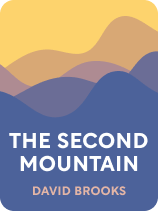

This article is an excerpt from the Shortform book guide to "The Second Mountain" by David Brooks. Shortform has the world's best summaries and analyses of books you should be reading.
Like this article? Sign up for a free trial here.
What’s the difference between a vocation and a career? Which do you have?
David Brooks tackles the “vocation vs. career” question by asking it in the context of two different approaches to life: individualism and relationalism. He connects careers to individualism and vocations to relationalism.
Continue reading to understand how vocations and careers reflect different purposes and, thus, garner different rewards.
Vocation vs. Career
Brooks discusses the “vocation vs. career” debate in the context of the two mountains. These are two different approaches to life that he describes in his book The Second Mountain. The first mountain is characteristic of individualism, which prioritizes personal liberty and spurns commitment. The second mountain is characteristic of relationalism, which celebrates community and prizes commitment. This context provides clues to the difference between a vocation and a career that Brooks sees.
According to Brooks, establishing your career is a key goal of individualism; you evaluate your talents, refine them through education, and choose the job that delivers the best return on investment. By contrast, a vocation isn’t found through a cost-benefit analysis. Rather, Brooks argues that vocations are found in response to an injustice that demands your attention.
(Shortform note: Though Brooks’s conception of vocation is broad, it’s worth noting that “vocation”—in Latin, vocationem—implies a higher purpose than that provided by a career. Indeed, the term originally had a religious connotation, and prior to Martin Luther, vocations were reserved for those in religious positions. In this view, vocations are a direct calling from God, rather than a purely personal calling.)
Brooks observes that careers satisfy the desires of the ego. When you have a successful career, you enjoy financial well-being and the respect of your peers. So, it’s unsurprising that the individualist approach to life emphasizes career success.
Vocations, however, are different. Because they involve righting an injustice, vocations often involve serving those less fortunate than yourself. Consequently, they rarely deliver the prestige that careers do. For example, those who dedicate themselves to working in homeless shelters don’t enjoy the same high status as corporate lawyers.
(Shortform note: Researchers have found that the prestige we attach to certain occupations depends on our own income and education level. On the one hand, those with lower incomes and education levels tend to assign prestige based on moral value; for these individuals, occupations that involve righting injustice are perceived as prestigious. On the other hand, those with higher incomes and education levels tend to discount moral value in assessing prestige, instead focusing on factors like how well a job pays and how much education it requires.)
Given the diminished material benefits, it’s natural to ask why you should prefer a vocation to a career. According to Brooks, the answer is simple: Vocations are central to your identity, so choosing a career over a vocation would amount to forsaking your identity.
Since vocations are oriented around serving others, Brooks concludes that they’re a key part of the relationalist approach to life. While careers satisfy the superficial desires that individualism highlights, he claims that vocations satisfy the deeper desire to dedicate yourself to a righteous cause.
(Shortform note: In Man’s Search for Meaning, Viktor Frankl offers some insight as to why vocations can make life meaningful. He explains that on a day-to-day level, our actions can help us discover purpose, assuming we find them meaningful. For example, if teachers believe their daily acts of discipline are molding future generations, they’re more likely to feel fulfilled by their job. So, if our vocation involves meaningful actions each day, it’s also likely to leave us fulfilled.)

———End of Preview———
Like what you just read? Read the rest of the world's best book summary and analysis of David Brooks's "The Second Mountain" at Shortform.
Here's what you'll find in our full The Second Mountain summary:
- The negative consequences of the West's focus on individualism
- Why you should embrace relationalism to lead a fulfilling life
- The four commitments that constitute relationalist living






